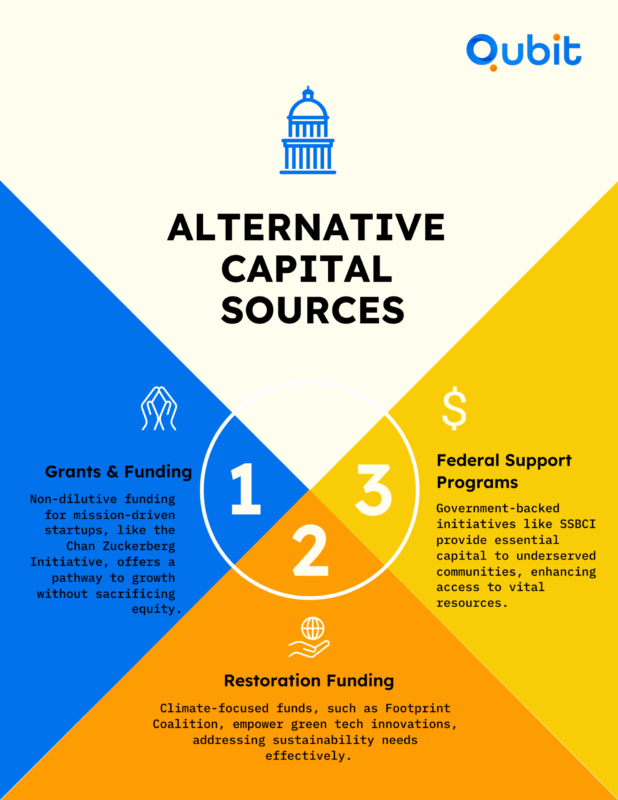Economic downturns can create significant challenges for startups, especially when it comes to securing capital. As businesses face tighter budgets and cautious investors, adapting fundraising strategies becomes essential for survival.
Whether we're in a recession or anticipating when the next recession will occur, understanding how to approach funding during these periods can make all the difference. Many entrepreneurs refine their approach to fundraising by exploring startup fundraising strategies that cater specifically to their unique needs.
This blog provides actionable, data-driven insights to help startups thrive despite financial uncertainty. From alternative funding sources to operational efficiency, the upcoming sections will explore practical methods to ensure your business remains resilient during tough economic times.
Recession Fundraising Tactics: Step-by-Step Strategies
Securing funds during economic downturns requires a thoughtful approach and strategic execution. With investors becoming cautious, startups must demonstrate resilience and adaptability. This section outlines actionable strategies to help businesses thrive even when we're in a recession.
1. Build a Strong Minimum Viable Product (MVP)
A well-developed MVP can be a game-changer during downturning economies. Investors are more likely to support ventures that showcase clear potential and a focused product roadmap. Highlighting successful funding rounds, such as JobGet’s $52 million Series B funding during the current economic downturn, can serve as proof of concept when pitching to investors. JobGet leveraged its robust MVP to attract significant investment, demonstrating the importance of product clarity and market fit.
2. Conserve Cash and Optimize Spending
Cash management becomes critical when economic conditions tighten. Businesses should prioritize essential expenses while identifying areas to cut costs without compromising operational efficiency. Implementing systems like IKEA’s ERP solution, which streamlined processes and increased ROI, can be a practical step. Startups can adopt similar solutions to improve efficiency and appeal to investors during challenging times.
3. Collaborate with Industry Peers
Collaboration can unlock opportunities that might otherwise remain inaccessible. Partnering with other startups or industry leaders can help share resources, reduce costs, and expand market reach. Building relationships with peers also fosters innovation, which can be a compelling narrative for investors.
4. Use Data-Driven Sales Forecasting
Accurate sales forecasting is essential to demonstrate financial health and future growth potential. Investors are more likely to commit funds when presented with reliable data that illustrates a startup’s ability to weather economic challenges. Utilize advanced analytics tools to refine projections and ensure they align with current market conditions.
5. Showcase Real-World Success Stories
Integrating real-world examples into your pitch can build credibility and instill confidence in investors. Highlighting cases like JobGet’s Series B funding or IKEA’s ERP implementation showcases how strategic decisions can yield positive outcomes even during recessions.
By combining these strategies, startups can position themselves as resilient and forward-thinking, increasing their chances of securing funding despite economic challenges.
Success in a Changing VC Landscape
Economic downturns often reshape venture capital (VC) strategies, creating both challenges and opportunities for startup founders. Diverse entrepreneurs, in particular, can thrive by adapting their approaches to meet these shifting dynamics. Experts, including Morgan Stanley’s Pete Chung, emphasize unconventional fundraising tactics during tough times.
To illustrate this evolving terrain, industry leaders liken it to a “road rally.” During economic booms, startups can accelerate freely, but downturning conditions demand strategic maneuvers to avoid obstacles and maintain momentum. As VC firms recalibrate their priorities, founders must align their pitches with these new expectations.
Empowering Founders with Capital Access
Securing funding during downturning markets remains a significant challenge for diverse founders, but innovative programs are making strides to close this gap. Morgan Stanley's Innovation Lab exemplifies this effort by providing essential resources and connections to underrepresented entrepreneurs. The Lab, which now operates two cohorts annually, has expanded internationally to London, broadening its impact.
Success stories from the program highlight its transformative support. For instance, an AI-enabled jobs platform has revolutionized employment opportunities, while a solar nanogrid manufacturer is addressing global energy needs. These case studies underscore how targeted assistance can drive growth even when we're in a recession.
To better understand the challenges diverse founders face, explore the Funding Gap. Additionally, programs like the Innovation Lab demonstrate how tailored initiatives can empower startups to thrive in uncertain times.
For proven strategies on securing capital, learn how to get startup funding.
Strategic Advice for Operational Efficiency
Startups often thrive under constraints, transforming challenges into opportunities. Founders should focus on identifying their "special sauce"—the unique competitive advantages developed during resource-scarce periods. This differentiation not only strengthens their market position but also resonates with investors looking for resilient and innovative companies.
Cutting costs without compromising quality is another critical strategy. Innovative approaches like embracing remote work and tapping into global talent pools can significantly reduce overheads. These methods allow startups to "do more with less," ensuring operational efficiency while maintaining flexibility in an unpredictable market.
As we're in a recession or facing economic uncertainty, prioritizing profitability over rapid growth becomes essential. Investors are increasingly drawn to startups that demonstrate sustainable growth models. Instead of chasing aggressive expansion, focus on balanced growth that emphasizes long-term value creation.
For startups refining their fundraising game plan, exploring how to raise capital for startup growth is essential. This approach ensures that operational efficiency aligns with financial strategies, making your business more attractive to potential backers.
Building a Path to Profitability
Economic downturns demand a shift in priorities for startups, with fiscal discipline taking center stage. Effective cash flow management becomes essential for survival, ensuring businesses can weather the storm and maintain operations. As venture capitalists increasingly favor startups with extended runways—ideally 24 months or more—planning for long-term financial stability is no longer optional.
A clear path to profitability not only reassures investors but also helps startups focus on sustainable growth strategies. Prioritizing profitability over aggressive scaling allows businesses to allocate resources wisely, avoiding unnecessary risks during uncertain times.
The current deal slowdown highlights the importance of adapting financial strategies to match market realities. Tools like financial planning software can incorporate this trend, adjusting forecasting models to reflect reduced deal volume and a heightened emphasis on fiscal responsibility.
For startups exploring tailored funding solutions, understanding startup funding options such as equity and debt can provide the flexibility needed to extend runway and achieve profitability.
Diverse Funding Avenues: Exploring Alternative Capital Sources

Economic downturns often compel startups to rethink their financial strategies, making alternative funding sources a vital consideration. Grants and philanthropic organizations, such as the Chan Zuckerberg Initiative, offer impact-driven funding opportunities that can sustain startups when traditional fundraising slows. For green tech ventures, the Footprint Coalition exemplifies how environmental restoration funding can align with business goals.
Federal initiatives like the State Small Business Credit Initiative (SSBCI) are also critical, deploying $10 billion to democratize capital access for underserved communities. These programs provide startups with a financial cushion during downturning economies.
Diversifying funding sources not only mitigates risks but also builds resilience. By exploring grants, philanthropic funds, and federal programs, startups can create a robust financial foundation to weather economic contractions.
Maximizing Existing Investor Relationships
Existing investors often play a pivotal role in securing follow-on funding, especially during downturning economic periods. By fostering trust and providing transparent updates on growth milestones, businesses can strengthen these relationships and ensure continued support. Clear communication of progress, backed by a roadmap of future objectives, reassures investors about the company’s direction and potential.
When we're in a recession, established investor connections offer stability, reducing the challenges of attracting new funding sources. These relationships are built on mutual understanding, making them invaluable during uncertain times. Sharing detailed insights into performance metrics and upcoming strategies can encourage reinvestment and deepen investor confidence.
Maintaining open dialogue and showcasing measurable achievements not only solidifies trust but also positions the business as a resilient and forward-thinking entity. As economic cycles fluctuate, nurturing these partnerships becomes a cornerstone for sustained growth and financial security.
Fundamentals of Startup Fundraising Explained
Securing funding is a critical milestone for startups, especially during downturning economic periods. Startup fundraising involves attracting capital from investors to fuel growth, often through structured funding rounds. These rounds—such as Seed, Series A, and Series B—represent stages of a company’s development and dictate the type of investors involved. For instance, early rounds may attract angel investors, while later stages often involve venture capital firms.
Investors typically evaluate startups based on their valuation and the strength of their Minimum Viable Product (MVP). Valuation benchmarks help investors gauge a startup’s potential return on investment, while a well-developed MVP demonstrates the viability of the product or service. Clear revenue models and market fit are also critical in convincing investors to commit funds.
Understanding these fundamentals is essential, particularly when we're in a recession. Economic uncertainty can heighten investor scrutiny, making it even more important for startups to present a compelling case for funding.
Conclusion
Achieving fundraising success requires a blend of strategic planning and adaptability. By focusing on actionable strategies like identifying alternative funding sources, implementing dynamic valuation adjustments, and preparing for economic downturns with comprehensive recession tactics, startups can position themselves for sustainable growth. Profitability remains a cornerstone, ensuring long-term viability and investor confidence.
If you’re ready to elevate your fundraising efforts, discover our Fundraising Assistance services at Qubit Capital – let’s build your success story together.
Key Takeaways
- Startups must adapt to changing VC landscapes by integrating data-driven strategies.
- A clear path to profitability and effective cash management are essential during downturns.
- Exploring alternative funding sources can diversify risk.
- Operational efficiency and targeted investor outreach enhance fundraising success.
- Regular reviews and planning are vital as recessions typically occur every six years.
Frequently asked Questions
How do you profit from economic downturn?
Economic downturns present opportunities for startups to thrive by emphasizing cost control, pinpointing unique value propositions, and targeting niche markets. These strategies enable businesses to adapt quickly and capitalize on changing consumer needs. Examples of successful pivots during challenging times highlight the importance of strategic agility.


 Back
Back



